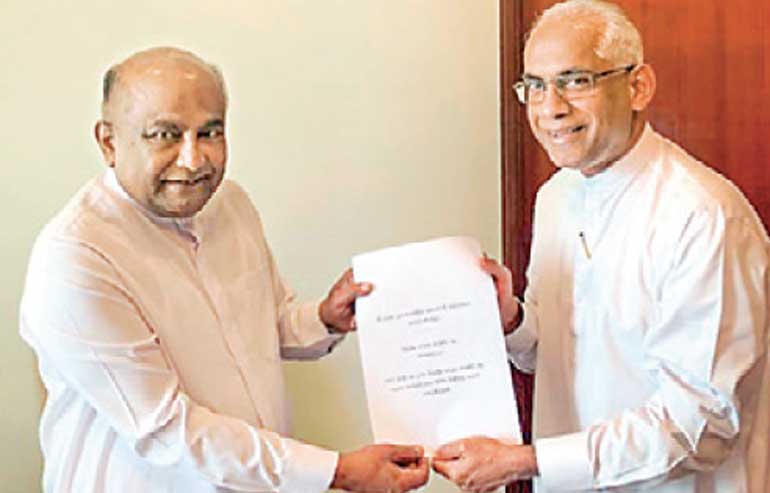Sunday Feb 22, 2026
Sunday Feb 22, 2026
Thursday, 9 March 2023 01:57 - - {{hitsCtrl.values.hits}}

SJB MP Eran Wickramaratne yesterday presenting the two private members bills to Speaker of Parliament Mahinda Yapa Abeywardena
Main Opposition SJB Parliamentarian and former State Minister of Finance Eran Wickramaratne yesterday presented two private members bills to the Speaker Mahinda Yapa Abeywardena to amend both the Value Added Tax Act No. 14 of 2002 (as amended) and the Special Commodity Levy Act No. 48 of 2007.
These two amendments seek to facilitate Parliamentary control over public finance as constitutionality required, and prevent the executive (Minister) from abusing statutory powers, including by (corruptly) granting benefits to a chosen few.
Wickramaratne said as the people of Sri Lanka are calling for more accountability and transparency with regard to public finances in the country, he brought these two amendments to ensure Parliamentary control on any changes to Value Added Tax (VAT) and to the Special Commodities Levy.
“Sri Lanka’s Parliament is constitutionally supposed to have full control over public finances (article 148). However, there is currently tax legislation that actually violates this imperative provision, and instead gives discretion to the minister on: (i) tax exemptions, (ii) tax base, and (iii) tax rate. This type of discretion is seen in two key tax acts, the Value Added Tax Act No. 14 of 2002 (as amended) and the Special Commodity Levy Act No. 48 of 2007,” Wickramaratne explained.
He said in both pieces of legislation, the Minister has complete discretion to change taxation and simply announce it through a Gazette notification. The decision to change taxation comes into effect immediately on the Minister’s signature and will only later be approved by Parliament. Even if it is not approved, whatever actions by the minister (e.g. reducing VAT or SCL) through the Order cannot be reversed by Parliament but only discontinued.
“This leaves an extraordinary amount of power in the minister’s hands and leaves room for the tax system to be abused in favour of vested interests and potential corrupt activities,” warned the SJB MP.
He alleged that the well-known sugar scam from 2020 is an example of the impacts of leaving the discretionary power with the minister. According to him, prior to October 20202, sugar taxes were Rs. 50 per kilogram of sugar, and were drastically reduced to 25 cents per kg. This is a reduction of 99.5% taxes on imported sugar. The gap between the cost to the importer and the market price has increased substantially after the tax reduction. According to the National Audit Office of Sri Lanka, between October 2020 and February 2021, we have cumulatively lost Rs. 16 billion in potential tax revenue.
He said PublicFinance.lk noted that the benefit of the tax reduction was not passed on to the consumer and importantly that Sri Lanka has lost approximately Rs. 59 billion in cumulative revenue from October 2020 until December 2022 by cutting the SCL on sugar imports.
“The discretionary power of the minister to make ad hoc changes to taxation can also have a serious impact on the country's economy. At a time when the country is facing a severe economic crisis, and when there are calls from the people to have more transparency and accountability of our public finances, it is imperative that Parliament retains full control over public finance as mandated by Article 148 of the Constitution,” Wickramaratne said.
“Therefore, I have submitted these two amendments to amend the VAT and SCL to promote fiscal accountability and ensure that decisions on taxation are transparent and are discussed in the public domain,” he added.
SJB MP also said the Government in 2022 tried to bring a new tax called the Special Goods and Services Tax (GST) Bill, which gave the minister similar powers to that which presently exists in the VAT and SCL framework.
However, the Supreme Court in very strong terms held the Bill to be unconstitutional and even violated the sovereignty of the People. The Court held: Thus, by empowering the Minister in the manner provided in clauses 2 and 3, the Parliament distinctively and manifestly loses control over public finance and unconstitutionally alienates such power to the Minister. In the circumstances, this Court holds that clauses 2, 3 and 4 individually and collectively amount to an infringement of Article 148 of the Constitution read with Article 76, and by virtue of such infringement violates Article 4 read with Article 3 of the Constitution.
“My proposed amendments will bring the relevant portion of the VAT and SCL laws in conformity with the constitutional framework, as recognised by the Supreme Court in the Special GST Bill Determination,” Wickramaratne added.